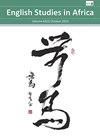‘Home is Another Country’: A Foucauldian Reading of Sisonke Msimang’s Always Another Country
IF 0.5
4区 文学
0 LITERATURE
引用次数: 0
Abstract
Abstract Sisonke Msimang’s Always Another Country is an intimate account of the lifelong search for ‘home’ by its autobiographical narrator, the child of exiled South African parents. My essay argues that Msimang’s figuring of a complicated, nationally-organized external realm through the exilic subjectivity of its narrator provides an opportunity to read a series of spaces in the text as what Michel Foucault, in ‘Of Other Spaces’ (1986), calls ‘utopias’ and ‘heterotopias’. Simply put, South Africa exists as a non-real space – a utopia – for most of the memoir. It carries down telephone wires and from television screens into the mind of Sonke, where it is reproduced as an alternate, imagined version of itself. On the other hand, ‘real’ spaces – living rooms, principals’ offices, family homes – all develop characteristics of Foucauldian heterogeneity. They are sites within sites or, as Peter Johnson explains, microcosms of reverse social ordering. Rather than producing an overly theoretical rendering of a deeply personal text, my essay aims to show the benefits of Foucauldian approaches in conceptualizing and understanding the complicated ways in which exiled-subjects occupy space in our nationally-organized world.“家是另一个国家”:西松克·姆西曼《永远是另一个国家》的福柯式解读
Sisonke Msimang的《总是另一个国家》是自传式叙述者一生寻找“家”的亲密叙述,他的父母是被流放的南非人。我的文章认为,姆西曼通过叙述者的被放逐的主体性,塑造了一个复杂的、国家组织的外部领域,这为阅读米歇尔·福柯在《论其他空间》(1986)中所说的“乌托邦”和“异托邦”提供了一个机会。简单地说,在回忆录的大部分篇幅里,南非是一个非真实的空间——一个乌托邦。它通过电话线和电视屏幕进入Sonke的脑海,在那里它被复制为另一个想象的自己。另一方面,“真实的”空间——客厅、校长办公室、家庭住宅——都发展出福柯式的异质性特征。它们是网站中的网站,或者,正如彼得·约翰逊解释的那样,是逆向社会秩序的缩影。我的文章不是对一篇深刻的个人文本进行过于理论化的渲染,而是旨在展示福柯式方法在概念化和理解流亡主体在我们国家组织的世界中占据空间的复杂方式方面的好处。
本文章由计算机程序翻译,如有差异,请以英文原文为准。
求助全文
约1分钟内获得全文
求助全文

 求助内容:
求助内容: 应助结果提醒方式:
应助结果提醒方式:


